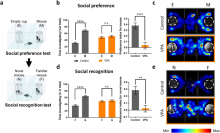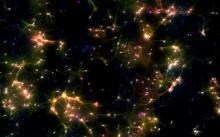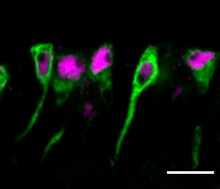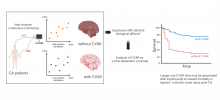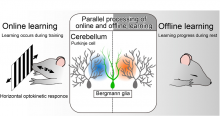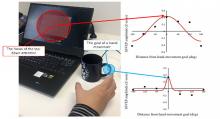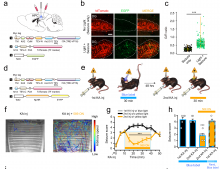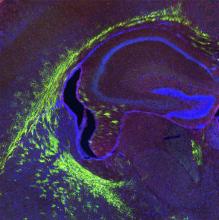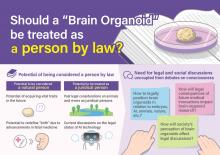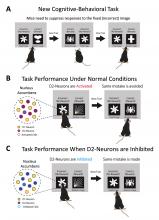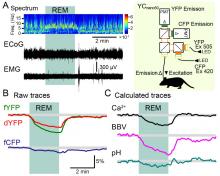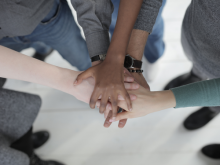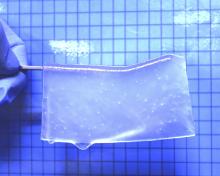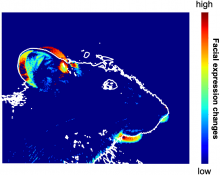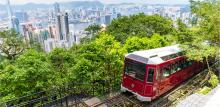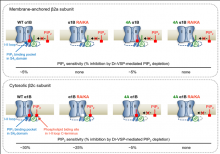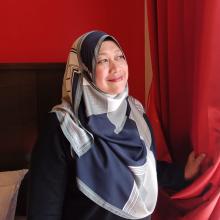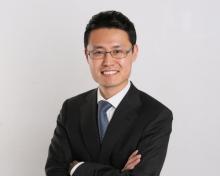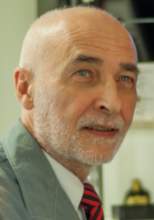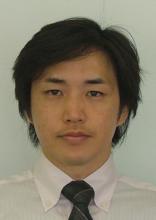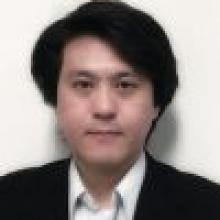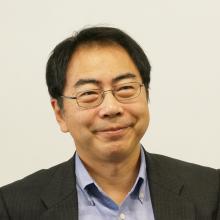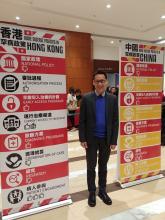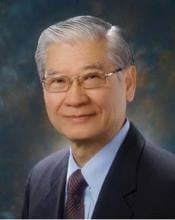Brain
News
08 Sep 2023
Asia Research News monitors the latest research news in Asia. Some highlights that caught our attention this week are a new species of fish that was spotted being sold at local markets, how humans almost went extinct, and an Earth-like planet that may be lurking in our solar system.
08 Sep 2023
Capturing carbon dioxide, Shells go nuclear, Worms surf electric fields, Brain repair & Creating matter from light. Plus from our blog: Monitoring research for further impact. Read all in the latest Editor's Choice.
05 Sep 2023
DishBrain reveals how human neurons work together to process information. Living model of brain could give insights into the mechanisms of how we understand and experience the world.
25 Aug 2023
Asia Research News monitors the latest research news in Asia. Some highlights that caught our attention this week are how melatonin can help us remember objects, drones that can assemble and disassemble in mid-air, and a new species of anemone.
18 Aug 2023
Asia Research News monitors the latest research news in Asia. Some highlights that caught our attention this week are vegan 3D printed calamari rings, 4 000-year-old ceramic pipes and ditches, and how swirling stars make some rethink how gravity works.
11 Aug 2023
Asia Research News monitors the latest research news in Asia. Some highlights that caught our attention this week are particle pollution linked to antibiotic resistance and microplastics being found in the body, fossils that show a marine reptile that used filter feeding, and how a connection in our brains compares our rewards to ones that others received.
08 Aug 2023
Fruit fly neural stem cells emerge as an exciting new model for unravelling the mysteries of dormancy, reactivation and neuronal regeneration. New studies unlock molecular pathways that could stimulate endogenous brain repair in neurodegenerative diseases and ageing.
07 Jul 2023
Asia Research News monitors the latest research news in Asia. Some highlights that caught our attention this week are a way to avoid biopsies by catching free-floating DNA, a large dip in the Earth’s surface under the Indian Ocean, and how people who brush their teeth before bed seem to have healthier hearts.
03 Jul 2023
A group of researchers at Osaka University used a noninvasive method to evaluate Cerebrovascular Autoregulation (CVAR) in patients after out-of-hospital cardiac arrest. The mortality rate increased significantly with the duration of time that CVAR was undetectable.
It has been suggested that CVAR, a function that is normally present in the normal state, may be impaired after cardiac resuscitation. However, the relationship between CVAR function and patient prognosis has been unclear. The research examined CVAR over time, using the moving Pearson correlation coefficient calculated from regional cerebral oxygen saturation and mean blood pressure data, and performed a survival analysis using the presence or absence of CVAR as a time-dependent covariate.
The findings of this study may first be useful in predicting neuroprognosis after cardiac resumption and may help avoid early withdrawal of treatment in those who may recover. In addition, they suggest that treatment and management that maintains proper CVAR after cardiac resumption may improve patient prognosis, which may be applied to the management of post-cardiac arrest resuscitation based on cerebral circulation to optimize treatment for each individual patient.
27 Jun 2023
Have you ever studied hard for a test the night before, only to fail miserably the next day? Alternatively, you may have felt unconfident after studying the night before when, to your astonishment, you recall effortless the content on test day. This discrepancy may be down to the separate and independent way in which our brain processes short- and long-term memory, Tohoku University researchers have revealed.
20 Jun 2023
To promote the message of productive ageing, Lingnan University (LU) joined hands with RTHK Radio 5, New Territories West Elder Academies Cluster, and Wofoo Social Enterprises to organise O Camp 2.0 on LU campus on 17 June. The event, themed ‘Intergenerational Day Camp’, aims to promote intergenerational harmony and offer LU students a platform to assist older people in experiencing university life. They also spared time to collaborate with secondary and primary school students to set a first leisure technology SDG World Record for enhancing elderly’s interest in gerontechnology’s application in a bid to improve their quality of life as well as build up Hong Kong into an age-friendly city.
18 May 2023
It’s not unusual for many of us to reach for a cup of coffee or cup of tea whilst focusing our attention on a screen. Scientists have long pondered whether our hand movements influence our spotlight attention. And now a group of researchers from Tohoku University have discovered that our spotlight attention and the attention paid to our moving hands operates via independent mechanisms.
11 May 2023
- Prof. Jung Ho Hyun’s research team at DGIST has developed a tool to verify the causal relationship between specific neurons and circuits and behavior
- This will provide new information for the development of treatments using light for neurological ad psychological disorders
05 May 2023
Scientists have found a lipid transporter crucial to regulating the cells that make myelin, the nerve-protecting sheath.
28 Apr 2023
Researchers discuss whether a "brain organoid" should be treated as a person by law, and suggest the need for legal and social discussions uncoupled from debates on consciousness.
25 Apr 2023
The Nobel prize winning physicist Niels Bohr once said, “An expert is a (person) that has made all the mistakes that can be made in a narrow field.” This idea that to master a skill we must learn from our mistakes and avoid making them in future has long been recognized; however, the brain mechanisms and pathways that control this ability have been poorly understood.
We revealed a specific brain pathway that allows us to identify and learn from our mistakes to guide better decision-making in future.
Our work is an important step towards understanding how the brain controls our daily choices and behavior. The identification of these cells as ‘mistake signalers’ may also help to guide new treatments for mental health conditions associated with impaired decision-making ability.
10 Apr 2023
Doctors at King Chulalongkorn Memorial Hospital have developed lightweight and easy-to-use Parkinson's gloves that can automatically reduce tremors, allowing patients to enjoy social life and reducing side effects from medication and risk from brain surgery.
23 Mar 2023
Asia Research News monitors the latest research news in Asia. Some highlights that caught our attention this week are how we are losing tribal languages, how living next to a road raises your blood pressure, and a flower hiding in plain sight.
10 Mar 2023
Asia Research News monitors the latest research news in Asia. Some highlights that caught our attention this week are how hanging out with friends can keep you healthy, eggs made from male mice, and taking one step closer to a machine that can read our minds.
03 Mar 2023
Changes in our REM sleep patterns could potentially be used to diagnose the severity of epilepsy, a new study by Tohoku University researchers has suggested. They showed that astrocytes - star-shaped glial cells that control the local ionic and metabotropic environment of the brain - exhibit an acid response with REM sleep in mice. They theorize that the acid response could be the underlying drive for specific information processing and generating plasticity during sleep.
01 Mar 2023
Brain shrinkage patterns tied to low trust have links to depression vulnerability that can alert to its early detection even before symptoms appear.
24 Feb 2023
Asia Research News monitors the latest research news in Asia. Some highlights that caught our attention this week are a robotic hand with a magic touch, a solution to reduce the negative effects of screen time in children, and a team charting dung beetles.
24 Feb 2023
Synthetic hydrogels were shown to provide an effective scaffold for neuronal tissue growth in areas of brain damage, providing a possible approach for brain tissue reconstruction.
06 Jan 2023
Asia Research News monitors the latest research news in Asia. Some highlights that caught our attention this week are how mysterious enormous space bubbles are formed, how drinking sweet drinks might contribute to hair loss, and a synthetic tissue created to give pigs back their erectile function.
30 Dec 2022
Asia Research News monitors the latest research news in Asia. Some highlights that caught our attention this week are a team trying to decipher dolphins’ secret language, why babies move so much in the womb, and a small enzyme that can control our sleep.
28 Dec 2022
New insights into the opposing actions of serotonin-producing nerve fibres in mice could lead to drugs for treating addictions and major depression.
28 Dec 2022
Taking Hong Kong’s famous Peak Tram up to Victoria Peak offers stunning views of its central business district, Victoria Harbor, and the surrounding islands. But a team of international scientists has recently discovered that the trams winding journey provides a previously unrecognized situation where our vertical perception gets distorted.
22 Dec 2022
A research team led by Osaka Metropolitan University has revealed a difference in neural activity in response to visual food stimuli, depending on whether those stimuli are presented consciously or unconsciously. Using a questionnaire to assess the study participants, the team found that this difference was associated with their scores on eating behaviors, including emotional eating and cognitive restraint of food intake. These results indicate that eating behavior cannot be understood without taking into account both unconscious and conscious neural processes.
14 Dec 2022
- DGIST Professor Suh Byung-chang's research team identified the regulation mechanism of calcium channels, which are important for signal transmission between nerve cells
- A new clue to the development of substances for treating mental and neurological diseases
Events
Sorry, no events coming up for this topic.
Researchers
Universiti Teknologi MARA (UiTM)
Kartini Ilias is a senior lecturer and clinical psychologist in Faculty of Health Sciences, Universiti Teknologi MARA, Puncak Alam, Selangor.
Korea Advanced Institute of Science and Technology (KAIST)
Professor in Electrical Engineering at Korea Advanced Institute of Science and Technology (KAIST).
Prof. Dr. Francisco J. Barrantes is the Head of the Laboratory of Molecular Neurobiology, BIOMED UCA-CONICET, Buenos
Aires, Argentina.
Kyoto University
Masanori Shimono is an associate professor at Kyoto University Graduate School of Medicine.
National Institute for Materials Science (NIMS)
Current: Deputy and Administrative Director & Principal Investigator of International Center for Materials Nanoarchitectonics (WPI-MANA) .
Professor at the Graduate School of Pure and Applied Sciences, University of Tsukuba
The Chinese University of Hong Kong (CUHK)
Professor, School of Life Sciences, The Chinese University of Hong Kong
Hokkaido University
Toru Kondo is Professor of the Division of Stem Cell Biology at the Institute for Genetic Medicine, Hokkaido University.
Giants in history
David T. Wong (born 1936) is a Hong Kong-born American neuroscientist who is best known for discovering the antidepressant drug fluoxetine, better known as Prozac.


